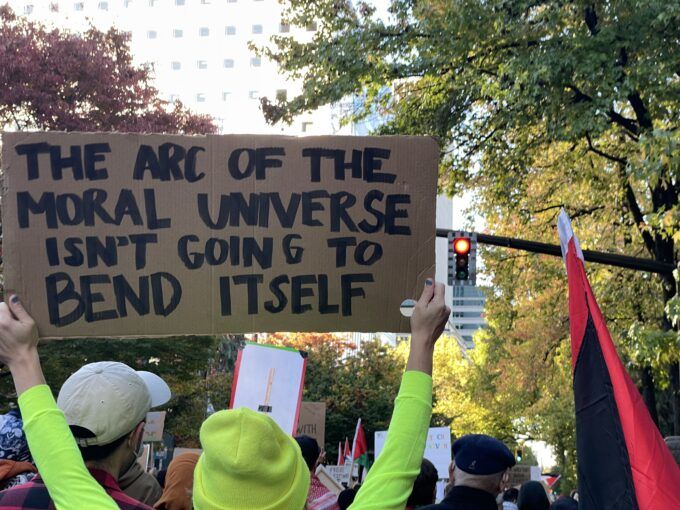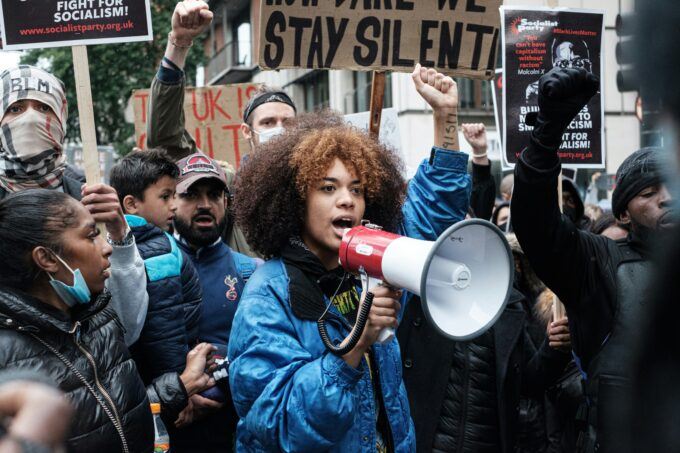Time to Go on the Offensive for Democracy

Photograph by Nathaniel St. Clair
No matter who we voted for, no one wants to see our grandparents forced onto the street, our schools without teachers, or our babies dying because there are no more hospitals. Yet all of these things will happen in the United States if deep cuts to essential programs like Social Security, SNAP, Medicare, and Medicaid take effect.
Greedy oligarchs like Elon Musk think democracy is just another shiny toy their billions can buy — that there’s no politician or public institution they can’t bend to serve their will. They want deep cuts to lifesaving services to fund massive tax breaks for the super-rich and for giant corporations.
They also want to dismantle our democratic institutions as fast as they can, so the harm is done before the people who will suffer most — you and I — have time to respond.
Republican leaders are trying to push nearly $1 trillion in cuts to essential services through Congress, while Musk chainsaws his way through the federal agencies that protect our water, air, and health. Many lives will be lost as a result.
But Musk’s real goal is to distract us from the nearly $5 trillion in tax breaks for corporations and the rich that he and other billionaires want President Trump to make permanent.
Lawmakers and progressive organizations have been slow to react to the speed and barbarity of these actions. Many of us are mired in a mix of shock, anger, and disbelief, while a sense of fear and frustration is setting in among the broader public. Most still don’t understand the scope of the destruction underway — or are simply ignoring it, hoping it won’t touch them or their loved ones.
This is all about to change.
The harms caused by these deep cuts to essential services affect so many of us, in all walks of life, that constituents’ anger is boiling over. For many Americans, it’s never been clearer that this is a fight between the very richest of the rich — the top 1 percent, who control nearly 16 times as much wealth as the bottom half — and the rest of us.
It’s not about who you voted for. It’s about who gets to live with dignity.
Grassroots, member-led groups like the one I lead, People’s Action, are stepping up to defend working people. We won’t wait on the sidelines while our members’ families and communities get hurt.
We brought our members from 60 congressional districts to Washington to tell lawmakers directly how these cuts will affect their families. And as members of Congress return home to their districts, we’re making our voices heard loud and clear that they must work for us, not for the greedy few.
The oligarchs underestimate the resolve of these millions of people from every background, who rely on essential programs like the Veterans Administration, Social Security, SNAP, Medicare, and Medicaid.
We do have the power to stop this, but only if we organize. Millions of people are starting to push back, and community groups need to be ready to help them make sense of this moment, and channel their anger and frustration into effective ways to strengthen our democracy.
Grassroots groups can show people how to find a new sense of community at the state and local levels, as well as ways they can participate in a national strategy to defend and expand the programs we all rely on. I urge you to find one in your community.
The stakes couldn’t be higher. The longer we wait, the more harm that will be done — and the more lives that will be lost. It’s time for every one of us to go on the offense to save our democracy.
Democracy’s Breaking Point

Image by Ehimetalor Akhere Unuabona.
How we lost our rights in the kingdom of Musk-Trump
As a person who consumes large amounts of information about peace and conflict in the world, I spend a considerable amount of time talking with people about how the governance of their communities is working. I talk with educators about what they are teaching and how they are teaching it. I speak with strangers while sitting in waiting rooms or on airline flights.
The woman sitting next to me in a doctor’s waiting room this morning was a retired nurse, and she had serious concerns. She told me that she keeps her license to practice current, because, “if they take away my healthcare, or something else, I will have to go back to work.” She asked what I do for a living; “believe it or not, I’ve spent more of the last 15 years teaching about the Constitution and American government and politics than anything else.”
Constitutional Crisis and the Erosion of Checks and Balances
A fact not enough people realize is that our constitutional democracy is fragile. It requires three co-equal branches of government with checks and balances baked in to keep each branch in line. Each branch has a role, and under Judicial Review (establish in Marbury v. Madison,1803), the federal courts have the authority to check the legislature and President by using their assigned right to interpret the Constitution and declare legislation and Presidential orders (when challenged in court) either constitutional or unconstitutional. The Supreme Court serves to safeguard against any tyranny, whether of one power-grabbing president or of the majority; a majority cannot undermine the fundamental values common to all Americans, i.e., freedom of speech, freedom of religion, and due process of law.
Yes, the President has great power, but that power is limited. The President is bound by the constraints of the Constitution, as determined by the courts, and the legislature can override a veto or impeach and remove a President. They are co-equal branches.
The Judicial Branch, however, does not enforce rulings. It can’t make others follow what it says—the Executive Branch does. We rely on the belief that our leaders will put the Constitution over themselves—as they have sworn oaths to do—and their “needs of the moment” will be subservient to the Constitution. Presidents of both parties have done this. This is how our democracy has endured. Each past President has taken the position that, “I am not above the law.”
The Trump administration’s lawyers, Musk’s DOGE team, and spokespersons are doing now is breaking from about 250 years of custom and practice by arguing that the checks and balances do not apply. A “administrative coup” is defined as: illegal overthrow of a government, but achieved primarily without overt violence and relying heavily by claiming powers, intimidation, bullying, extortion, threatening media, and thereby seizing all powers.
Trump, and his administration and volunteers, act as though they do not have to follow federal court decisions that say his orders are unconstitutional. This position is unprecedented and extremely dangerous. And since Republicans have abdicated their power in Congress, the crisis gains in strength. He thinks he can get away with it, if the people don’t stop him, because the federal courts do not have enforcement power. Armies, the police, and other enforcement mechanisms are all under the Executive Branch, but they have also sworn oaths:
“I will support and defend the Constitution of the United States against all enemies, foreign and domestic”
The U.S. Constitution is an honor-code system. We have always relied on good faith (and Congressional oversight) that no one will break the pact (or they will be removed from office). We have always taken the position that our Presidents will not defy the federal courts and, for that matter, that the American people would not elect someone who would do such a thing. But now we have elected such a person.
You might think, “But I love Trump’s policies. Screw the federal courts that are holding him back.” That is short-sighted. Once the system is broken, it is broken. If a Democrat later takes office, that person can do whatever they want with no checks and balances. If they want to send agents into your house, search it for evidence that you criticized the President, and lock you up in a jail cell without ever seeing a judge, you might say, “They can’t, that’s unconstitutional!” Too late. That precedent will have been established. No checks and balances. If Trump succeeds in what he’s trying to do, any future President (if there are any) can do whatever they want.
Cooperative Problem-Solving and Conflict Management
While recognizing the severity of this constitutional crisis, it is also crucial to focus on how conflicts like this can be addressed through cooperative problem-solving. Conflict management does not mean compromising on the rule of law, but it does mean using strategies that can preserve democratic institutions even in times of crisis.
Public pressure has historically played a role in preserving democracy. Citizens either demand accountability and uphold constitutional principles regardless of political affiliation or we slide toward a system as broken as Russia’s or North Korea’s. Open communication between elected officials, the judiciary, and the public is essential. Legal scholars, activists, and community leaders should work together to develop solutions that reinforce democratic norms, including legislative reforms that explicitly define executive limitations.
At a community level, it is essential to foster conversations that cut through partisan divides. Engaging with those who may not fully grasp the consequences of constitutional erosion can be more productive than confrontation. A shared commitment to democracy can serve as common ground even among people with differing political views.
Specific Threats to Constitutional Rights
Rights are being stripped from everyone. U.S. citizens have been deported without due process. Long lists of people—citizens and non-citizens alike—have had their rights violated in direct defiance of judicial review and court rulings prohibiting such actions.
Some wrongly assert that constitutional rights only apply to U.S. citizens, but in fact, human rights and most civil rights apply to everyone within the United States, with only rare exceptions (e.g., non-citizens cannot vote in federal elections). The Constitution’s protections are not dependent on citizenship; due process, equal protection, and fundamental freedoms apply to all persons under U.S. jurisdiction.
If these violations go unchecked, the erosion of constitutional rights will not stop. History shows that when governments normalize violations against one group, that expands their power to restrict rights for others. Once the precedent is set that a President can defy court rulings on due process, no one’s rights are safe.
If these patterns continue, any administration—Republican or Democrat—could push beyond what has already been done, normalizing authoritarian tactics. Preserving the Constitution requires vigilance, education, and action from everyone who values democracy, regardless of party or ideology. But, let’s face it, without a Constitution we will cease to be a democracy at all. A fascist takeover has started, and it is up to the people to save it.
No comments:
Post a Comment